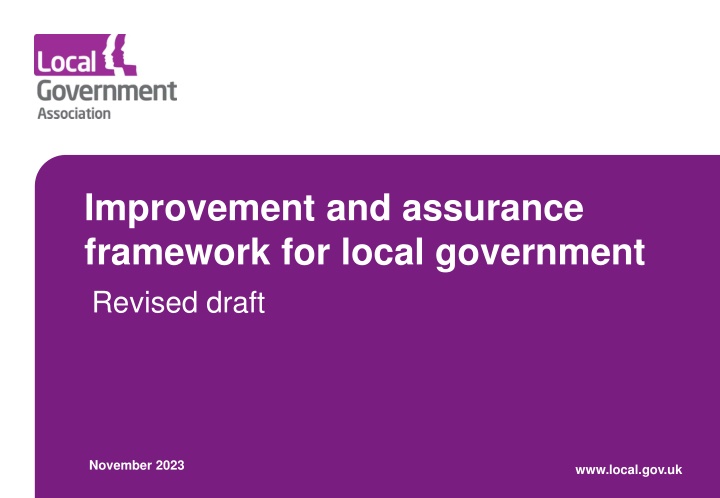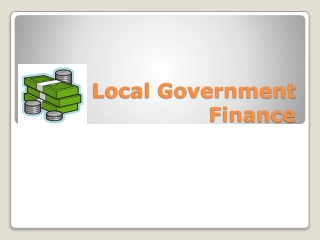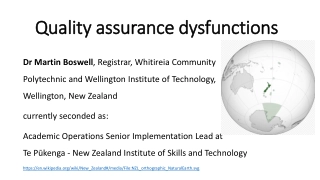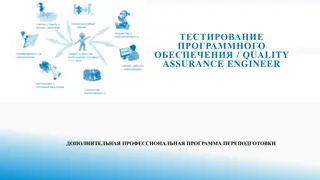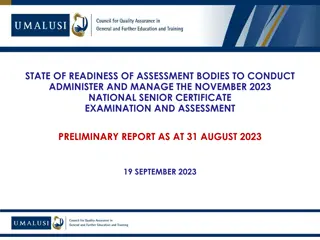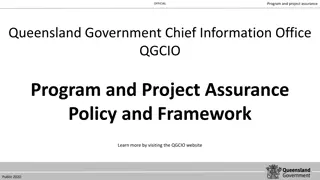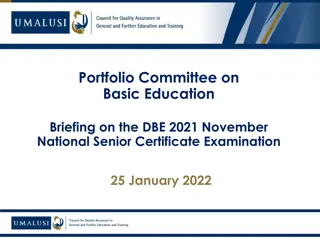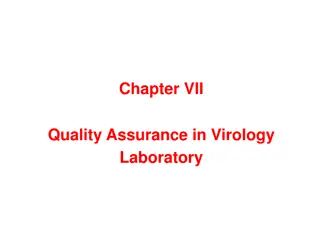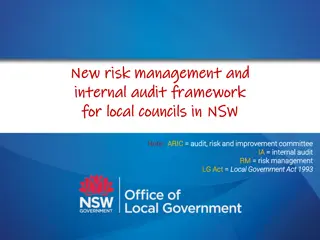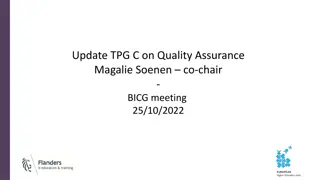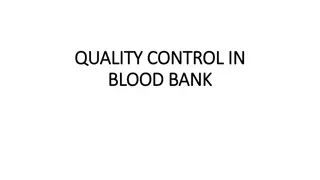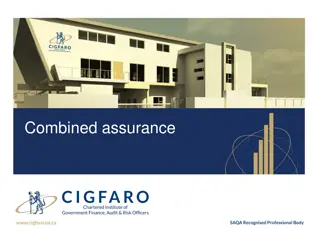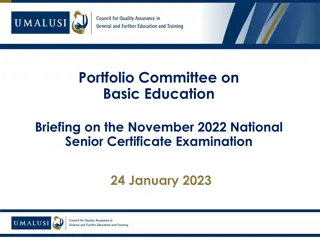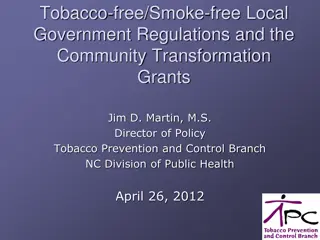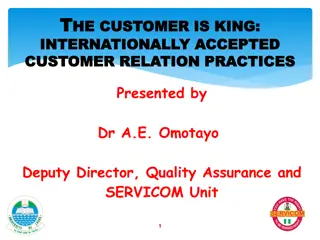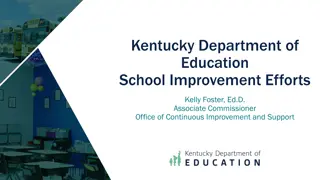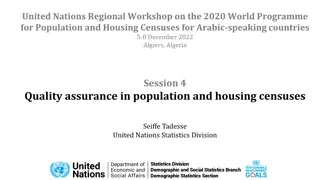Improvement and Assurance Framework for Local Government - November 2023
Local authorities play a crucial role in their own performance and improvement, guided by the sector-led improvement approach. This framework emphasizes accountability, transparency, and continuous improvement, supported by tools and resources provided by the LGA. Assurance and accountability mechanisms ensure trust in decision-making processes and focus on improving the quality of life for communities.
Download Presentation

Please find below an Image/Link to download the presentation.
The content on the website is provided AS IS for your information and personal use only. It may not be sold, licensed, or shared on other websites without obtaining consent from the author.If you encounter any issues during the download, it is possible that the publisher has removed the file from their server.
You are allowed to download the files provided on this website for personal or commercial use, subject to the condition that they are used lawfully. All files are the property of their respective owners.
The content on the website is provided AS IS for your information and personal use only. It may not be sold, licensed, or shared on other websites without obtaining consent from the author.
E N D
Presentation Transcript
Improvement and assurance framework for local government Revised draft November 2023 www.local.gov.uk
Background Local authorities are responsible for their own performance and improvement. This is recognised in the sector-led improvement (SLI) approach which is underpinned by the key principles that councils: are primarily accountable locally have a sense of collective responsibility for the performance of the local government sector. Sector-led improvement has always played a part in providing assurance for local authorities of their own performance. Increasingly, it is contributing to the assurance of councils performance for the wider public and central government. The LGA provides councils with essential tools and resources to respond to opportunities, address complex challenges and facilitate continuous improvement. We also maintain an overview of the performance of the sector. Benchmarking information on LG Inform is freely available to all and enables any council s performance to be compared with any other council or group of councils. Corporate peer challenge reports are all published: we have made this work more robust by requiring councils to produce action plans, with a progress review in the following 12 months. On a daily basis, sector-led support shines a light on issues such as governance, financial planning or performance, enabling councils to take early action before those issues become more serious. www.local.gov.uk
Assurance and accountability in local government (1) There are many opportunities for local authorities to be held to account and these can contribute to trust in the decision-making process. Councils conduct their business in the most open and transparent way of all public authorities. Decisions are made on the basis of openly available written advice and the overwhelming majority of decisions in the public interest are made in open public meetings. The structures that reinforce this accountability include free and fair elections for members making public decisions, independent external audit, independent regulation of service standards and practice and opportunities for individuals and their advocates to complain and seek remedy and redress for service and ethical failures. All councils have internal controls, and challenges to ensure that they adhere to good governance principles. These include councillor scrutiny, audit and risk controls, the publication of annual governance statements, the everyday actions of officers who have statutory roles for financial matters, propriety in decision making and responsibility for management arrangements. Additionally, councils challenge and support each other to continuously improve, supported by the LGA. www.local.gov.uk
Assurance and accountability in local government (2) Local authorities exist to improve the quality of life and quality of places for the communities they serve. Therefore, the focus of councils assurance work is on the assurance they provide to their local communities. Currently, there is no document or framework which sets out, in one place, the various required elements of council assurance and how they all fit together for both councils and the public to see. www.local.gov.uk
What are we aiming to achieve? 1. To describe the assurance framework which currently exists but is not yet written down for the local government sector, in the interests of clarity and transparency, to aid understanding of how they all work together and to support improvement of practice. Since the scope and objectives of the sector are so wide-ranging, we have mainly focused on corporate, rather than service-specific sources of assurance, and the elements which provide essential assurance in all councils. Effective corporate assurance will support assurance of individual services. Each council will additionally identify their own local objectives, for which they are accountable to their local electorate. 2. To consider whether: any of the current checks and balances could be simplified, improved or enhanced to provide greater assurance for the sector; any further action is required to ensure that support and assurance for those requiring a higher level of assurance are used suitably and in the timeliest way possible. www.local.gov.uk
What have we done so far? The LGA has convened discussions with the sector (including political leaders), professional associations and others. We have also engaged with the Department of Levelling Up, Housing and Communities as part of this conversation. Our work has been informed by a Sounding Board with representation from SOLACE, CIPFA and Lawyers in Local Government (LLG). The feedback we received has helped us to: Revise our draft definitions of assurance and accountability for the local government context; Revise our initial draft map of the elements of the assurance and accountability framework for local government; Identify common themes related to the operation of assurance and accountability in local government, with related principles and good practice; Inform the development of our improvement support offers. www.local.gov.uk
What do we mean by assurance? Information, evidence and evaluation of how local authorities are delivering their duties, functions and outcomes, which can be used to hold them to account and may give confidence. There should be no assumption that assurance will always be gained in some cases the outcome will be not assured . www.local.gov.uk
How does accountability work? There are multiple elements of accountability in local government, for example: Elected members to their constituents The executive to Overview and Scrutiny The executive and the organisation to audit committee Officers to the council (through line management) Specific statutory officers to full council (through reporting responsibilities) Officers to their professional bodies in relation to professional standards and conduct (where applicable) The council for its stewardship of public resources (through external audit) The council to Ombudsmen/ inspectors/ regulators The council to Government departments (through grant funding arrangements) The council to parliamentary select committees (as and when required) The council to the courts/ redress schemes The council to wider partnerships, bodies and authorities www.local.gov.uk
We are seeking the views of the sector on the principles of assurance and accountability, examples of good practice and revised diagrams of the elements of the improvement and assurance framework on the following slides We will then publish a revised version, with accompanying guidance notes, good practice examples and links to other relevant documents www.local.gov.uk
DRAFT Principles of assurance and accountability Clarity who is accountable for what? Proportionality A whole-council approach A culture of assurance and accountability Monitoring against standards/ benchmarks/ local targets Data quality/ credibility of information Transparency/ public accessibility/ intelligibility of information www.local.gov.uk
What does good look like? Visible/ collective ownership and leadership of good governance at senior political and managerial levels Everyone including wider stakeholders understands their contribution to assurance A learning organisation: self-awareness, open to challenge Assurance as a constant management process, not a one-off event Assurance activity increases as risk increases Assurance supports achievement of priority outcomes Good communication with the public on performance and how they can contribute to holding the council to account Regional/ sub-regional/ national oversight, challenge and support www.local.gov.uk
DRAFT What do councils to do assure themselves? internal actions Corporate directors operational delivery, benchmarking, clienting Directorate assurance statements Project/ programme management Data quality assurance Performance appraisals Ensure appropriate governance and reviews of joint ventures/ local authority trading companies/ partnerships Performance/ finance/ risk reporting inc: Corporate plan objectives delivery Statutory performance compliance (eg planning applications, FOIs) National reporting (eg ASCOF) Savings delivery Complaints Internal audit advice Children s/ Adults Safeguarding Boards Consultation/ engagement Training/ compliance with policies/ processes (eg procurement) Corporate programme/ project management Corporate management team operational and strategic delivery (inc benchmarking) Performance, finance and risk reporting inc: Corporate plan objectives delivery Statutory performance compliance (eg planning applications, FOIs) National reporting (eg ASCOF) Savings/ MTFS delivery Complaints Corporate health indicators (eg staff turnover, grievances) Staff/ resident surveys Contribute to review of internal controls/ Annual Governance Statement Consider/ respond to Internal/ External Audit annual opinions/ reports Head of Paid Service Review corporate performance reporting to inform actions to ensure appropriate number, grades, organisation, management of staff for discharge of functions Ensure appropriately senior/ skilled staff employed, including for: Risk management Health and safety Emergency planning Ensure appropriate person leads review of controls, consistent with CIPFA/ SOLACE guidance Adopt/ review whistleblowing policy Golden Triangle meetings Monitoring Officer with s151 officer Scheme of delegation Senior Information Risk Owner/ Caldicott Guardian Designated responsibility for information governance/ protection of confidentiality of health and care information/ ensuring proper use Monitoring Officer Responsible for/ regularly review constitution - consistency with legislation/ best practice Oversight of arrangements for member decision making - compliance with constitution/ legislation and scrutiny (working with Democratic Services) Principal adviser to Standards Committee S151 officer Oversight of financial affairs to ensure proper administration (inc budget- setting/ budgetary controls, counter fraud policy, procurement processes) Head of internal audit Prepare/ implement annual internal audit plan Audit governance/ risk/ controls/ policies/ processes/ reporting IA QA & improvement programme
DRAFT What do councils to do assure themselves? activity by Members and officers Community safety partnership oversight of development/ implementation of strategies (Crime & Disorder Act, 1998) [cross-organisation strategies are mandatory] Portfolio Holder/ Director regular review of performance/ finance risk Professional advice to inform member decision making Commission peer-led reviews from LGA Regional networks Professional bodies Establish a Council Improvement Board where appropriate
DRAFT What do councils to do assure themselves? externally visible actions Executive/ Policy & Resources Committee reviews performance, finance and risk reporting on strategic delivery, inc: Corporate plan objectives delivery Statutory performance compliance (eg planning applications, FOIs) National reporting (eg ASCOF) MTFS delivery Corporate health indicators (eg staff turnover, grievances) Individual duty to report to full council: Head of Paid Service - arrangements for discharge of authority s functions (s4 report) S151 officer unlawful expenditure/ action (s114 report) Monitoring Officer decisions contravening law; maladministration, injustice (s4 report) DCS sufficiency of resources Overview and Scrutiny Committee(s) Supported by Statutory Scrutiny Officer Reviews performance/ finance reports Pre-decision scrutiny Call-in Scrutiny reviews Full council Considers s25 statement on robustness of estimates/ adequacy of reserves for annual budget/ precept Reviews Scrutiny annual report, holds Chair to account Reviews Audit Committee annual report, holds Chair to account Reviews Standards Committee annual report Appoints appropriately qualified statutory officers Appointments Committee -Recommends to full council appointment of appropriately qualified statutory officers Audit Committee [statutory for CAs only] Monitors/ reviews controls, risk management, financial reporting; holds internal/ external audit to account Approves internal audit plan, oversees implementation, ensures compliance with PSIAS Reviews internal/ external audit reports/ opinions; oversight of management responses Assesses own practice/ external review annually [recommended] May include lay members to provide additional expertise Committee with delegated responsibility for governance Reviews Annual Governance Statement Oversees regular reviews of constitution Standards Committee Reviews member code of conduct, arrangements for investigating conduct complaints Reviews Monitoring Officer s annual report Seeks perspective of Independent Person(s) Pensions Committee (accountable to scheme members)
DRAFT What do other bodies do to gain assurance? (non-public) Regional networks benchmarking, constructive challenge, improvement support Government departments ad hoc requests for information/ assurance Professional bodies standard setting, qualifications, capability/ disciplinary procedures, tools to support decision making: CIPFA (all professionals) / ICAEW / ACCA Solicitors Regulation Authority/ CILEX/ Legal Services Board Faculty of Public Health (appraisal/ revalidation/ recruitment) Grant funding bodies reporting requirements (many and varied, including where council is accountable body for other agencies/ wider partnerships) Political parties disciplinary/ assurance processes DLUHC officials early engagement to understand challenged councils/ identify support requirements
DRAFT Where/ how are councils accountable publicly? Committee with delegated responsibility for governance Reviews/ challenges/ approves Annual Governance Statement (Chief Executive/ Lead member are accountable as signatories to statement) Reports of Ombudsmen/ inspectors/ regulators Local Government & Social Care Ombudsman/ Housing Ombudsman decisions, letters, reports Ofsted CQC HMI Probation Building Safety Regulator EHRC Social Housing Regulator Information Commissioner Audit Committee [statutory for CAs only] Annual report to full council, including results of annual assessment Internal auditor s annual report External auditor s annual report and opinion (accounts and vfm judgement) English Devolution Accountability Framework (Combined Authorities) Government intervention Oflog Planning designation Best Value- non-statutory/ statutory Adult social care Children s social care - improvement notice/ statutory direction Overview and Scrutiny - holds executive to account for decisions and actions that affect their communities Full Council - Those charged with governance Ultimate accountability for governance and non-executive functions Considers Public Interest Reports, statutory recommendations, advisory notices from external audit Agrees annual budget and MTFS, Treasury Management Strategy Parliamentary select committees Judicial system Civil/ criminal litigation Judicial review Media/ residents/ businesses - can hold council to account through: Attending public decision-making/ scrutiny meetings Complaints/ redress schemes Rights to ask auditor questions/ raise objections Informed by access to member decision-making reports, Forward Plan, documents published in accordance with Local Government Transparency Code 2015, Public Sector Equality Duty, FOIs/ EIRs/ SARs Local elections Informed by manifestos Performance reports to Committee/ Executive Delivery against targets Delivery against standards/ benchmarks
Questions 1. Do you have any comments on this revised draft framework? 2. Should focus on any elements of this framework increase as risk increases? 3. Are there any elements of this framework where there should be more consistency of practice across the sector? 4. What would best support councils to develop the effectiveness of their own assurance and its reporting to their communities? 5. What would sector-wide assurance look like? www.local.gov.uk
Any other questions or comments? Contact: Heather.wills@local.gov.uk www.local.gov.uk
